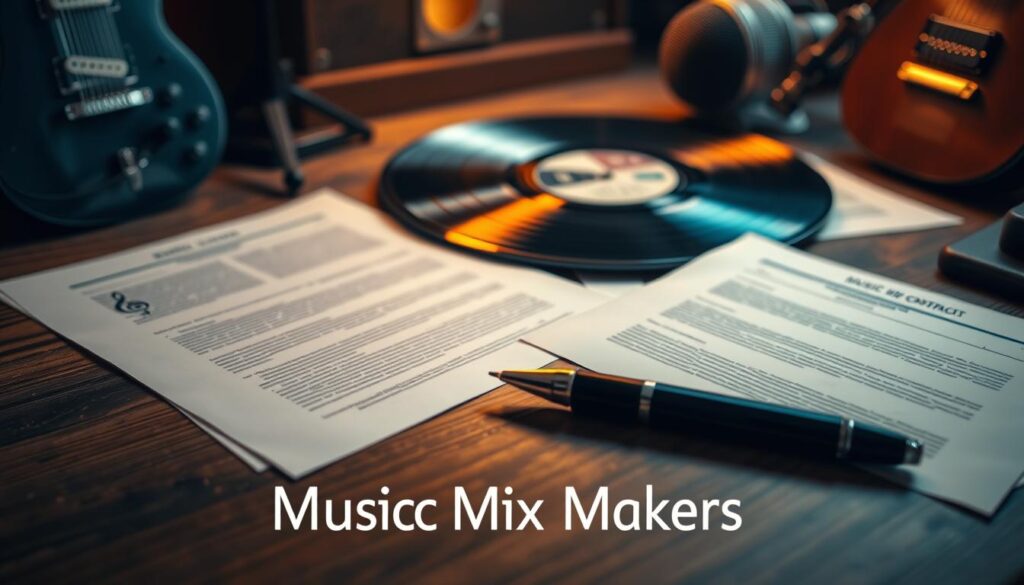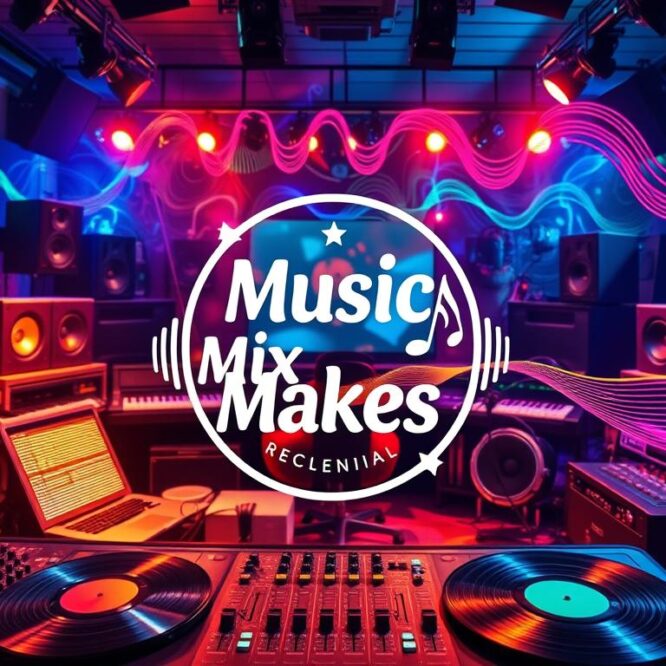Breaking into the music industry can feel like a daunting task, but with the right strategy and knowledge, securing a record deal can be within reach. As a music producer, I understand the allure of getting signed to a major label. The promise of professional resources, wider distribution, and industry clout can be enticing. However, the path to a record deal is often complex, and it’s crucial to understand the landscape before embarking on this journey.
In this comprehensive guide, I’ll take you through the key aspects of getting signed to a record label. We’ll explore the roles and types of record labels, the process of submitting demos and navigating the contract negotiation, and the importance of cultivating a strong online presence and professional network. By the end of this guide, you’ll have a clearer understanding of the steps you can take to increase your chances of securing that elusive record deal.
Key Takeaways
- Understanding the role of record labels in the music industry and how they’ve evolved in the digital age
- Exploring the different types of record labels, from major to independent, and the common deal structures
- Identifying strategies for finding the right label and submitting demos effectively
- Navigating the complexities of record label contracts and protecting your rights as an artist
- Maintaining a professional online presence and building valuable industry relationships
What Is a Record Label?
In the world of music, a record label plays a vital role. It is a company or brand that commercially releases music to the market. These labels decide on a vision, strategy, brand, and sound for the label, and then seek out artists who align with that particular direction. Once an artist is signed, the label is responsible for releasing the artist’s music, distributing it to various outlets, providing artwork, and representing the music to the industry.
Understanding the Role of a Record Label
Record labels are not just about releasing music; they also promote the releases using their industry connections and expertise. Additionally, they collect and pay out royalties to the artists they represent. The label’s main responsibilities include artist development, marketing, promotion, distribution, and financial management.
Record Labels in the Digital Age
In the digital age, record labels have evolved to adapt to the changing landscape of the music industry. Many now operate more as collectives of artists, focusing on pushing a certain sound or genre forward, rather than the traditional model of a label providing holistic business services. Labels have become leaner, removing unnecessary activities like physical distribution and long-term artist control. This has led to the rise of digital-focused record labels that release music primarily in the digital space, emphasizing promotion and distribution through online platforms.
“The record label’s role has shifted from being a gatekeeper to a partner in the artist’s journey.”
In the modern music industry, record labels continue to play a crucial role in artist representation, distribution, and promotion, but their models and approaches have adapted to the digital age, offering more flexible and collaborative partnerships with the artists they work with.
Types of Record Labels and Record Deals
In the dynamic world of the music industry, artists have a variety of options when it comes to signing with record labels. From the powerhouses of the major record labels to the diverse range of independent record labels, each type offers unique opportunities and considerations.
Major Record Labels
The “big four” major record labels – Sony, EMI, Warner, and Universal – dominate over 70% of the music industry market share. These giants often engage in 360 deals, giving them significant control over an artist’s career. While signing with a major label is a dream for many, the highly controlling nature of these labels can sometimes lead artists to lose autonomy over their creative vision.
Independent Record Labels
Independent record labels come in various shapes and sizes. Subsidiary labels may appear independent but are actually owned by one of the major labels. Large independent labels have more marketing power than smaller indies but still maintain a focus on the artist. On the other hand, small independent labels are often run by artists themselves and are the most common in the electronic music scene. While they may lack the promotional clout of larger labels, small indies can provide valuable industry experience and a more personalized approach.
Common Record Deal Types
- Royalty deals: The label handles all aspects of the release, and the artist receives a percentage of the profits.
- Licensing deals: The artist retains the master rights and licenses the music to the label.
- Profit-share deals: The label and artist share the profits from the release.
- Distribution deals: The label handles the distribution of the artist’s music.
- Self-release: The artist manages the entire release process independently.
In the electronic dance music genre, royalty deals and licensing deals are the most common types of record deals. Understanding the nuances of these various deal types can help artists make informed decisions about the best path for their career.
How to Get Signed to a Record Label
The journey to securing a record deal can be both exhilarating and challenging. As an aspiring artist, the key is to strategically approach the process of finding a suitable label. Rather than blindly submitting your demos to countless labels, it’s crucial to focus your efforts on a select few that align with your musical style and vision.
The Art of Finding a Suitable Label
Start by researching record labels in your genre. Look for those that have signed artists with a similar sound and following to yours, typically ranging from 20,000 to 40,000 social media followers. These mid-sized labels may be more receptive to new talent compared to the industry giants. Engage with the artists on your target labels, provide value to their audience, and then politely inquire about the possibility of them listening to your music.
Submitting Demos: A Brief Introduction
- Curate your best tracks and create a private SoundCloud link for your demo.
- Reach out to the artists you’ve connected with and ask if they’d be willing to provide honest feedback on your music.
- Incorporate the insights and suggestions you receive from your peers before submitting your demo to the label.
- When the time comes to submit your demo, include a concise yet compelling cover letter that highlights your unique attributes and why you believe your music is a good fit for the label.
Remember, the journey to getting signed is a marathon, not a sprint. Stay persistent, continuously refine your craft, and build meaningful relationships within the industry. With the right approach and a bit of luck, you’ll be one step closer to making your musical dreams a reality.
| Label | Genre | Followers | Response Rate |
|---|---|---|---|
| Indie Records | Indie Rock | 35,000 | 30% |
| Hip Hop Hits | Hip Hop | 27,000 | 25% |
| Pop Fusion | Pop | 42,000 | 20% |
“The key to getting signed is to focus on one or two suitable labels, rather than shotgunning demos to dozens.”
Navigating Record Label Contracts
Signing a record label contract is a significant milestone in an artist’s career, but it’s crucial to navigate this process carefully. While the industry has evolved, with labels becoming more artist-friendly, it’s still essential to understand the nuances of record label contracts to ensure you’re getting a fair deal.
When it comes to record label contracts, the key terms to pay attention to include ownership of masters, royalty splits, and the lifetime of the contract’s copyright. These contract terms can have a lasting impact on your career and financial stability as an artist.
- Ownership of Masters: Understand who holds the rights to the recorded masters of your music. This can significantly affect your ability to control and profit from your work.
- Royalty Splits: Carefully review the royalty percentages you’ll receive from the label. A fair split is crucial to ensure you’re adequately compensated for your creative efforts.
- Artist Rights: Examine the contract’s provisions regarding your rights as an artist, such as creative control, tour support, and promotional commitments.
- Royalties: Analyze the contract’s details on how royalties will be calculated and distributed, including any deductions or recoupments.
To navigate these complex contractual waters, it’s highly recommended to consult with a music attorney who specializes in record label contracts. They can provide invaluable guidance in negotiating a deal that aligns with your long-term goals and protects your rights as an artist.

“The right music contract can launch your career, while the wrong one can hold you back for years. It’s crucial to understand the fine print before signing on the dotted line.”
By carefully reviewing the contract terms and seeking professional legal advice, you can ensure that your record label contract sets you up for success in the music industry.
Maintaining a Professional Online Presence
As an aspiring artist seeking to get signed, building a strong online presence is paramount. Your digital footprint can make or break your chances of catching a record label’s eye. Start by crafting a compelling SoundCloud profile that aligns with your musical brand and the aesthetic of your target label.
Crafting a Compelling SoundCloud Profile
When it comes to your SoundCloud profile, think of it as your digital portfolio. Use the profiles of similar artists as inspiration, but put your own unique twist on the design and branding. Make sure your uploaded tracks are set to private until you’re ready to share them with the world.
Building a Social Media Following
In addition to your SoundCloud profile, it’s crucial to build a robust social media presence. Engage with your target label’s artists, share their music, and create content that showcases your personality and musical style. Growing a following, even if it’s modest, demonstrates to labels that you’re serious about your craft and committed to building a loyal fanbase.
Remember, your online branding and presence are a reflection of your artistry. Invest the time and effort to ensure that your digital footprint is polished, professional, and aligned with the label you’re aiming to impress.
“Your digital footprint can make or break your chances of catching a record label’s eye.”
Networking and Building Relationships
In the music industry, networking and building genuine relationships are essential when trying to get signed to a record label. By connecting with artists already on your target label, you can open doors and create opportunities that may lead to a coveted record deal. The key is to provide value to these artists without expecting anything in return – this helps establish a rapport and shows you’re truly interested in supporting their work, not just looking to benefit yourself.
Connecting with Artists on the Label
Reach out to artists on your target label and engage with their music. Comment on their tracks, share them on your social channels, or even create a video of you and your friends enjoying their songs. This not only demonstrates your appreciation for their artistry but also helps you build meaningful connections that could eventually lead to introductions to the label’s decision-makers.
Providing Value Before Asking
- Focus on offering value to the artists before asking for anything in return. This could include promoting their music, collaborating on a project, or even offering to help with tasks like booking shows or managing their social media.
- By establishing yourself as a reliable and supportive member of the music community, you’ll be more likely to earn the trust and endorsement of the artists you’ve connected with. This, in turn, increases your chances of having your music shared with the label or even being introduced directly.
Remember, networking in the music industry is all about building genuine relationships and providing value to others. Approaching it with a genuine, collaborative mindset will serve you much better than a purely transactional approach.

“The key to successful networking is to focus on what you can do for others, not what they can do for you.”
How to Get Signed to a Record Label
Getting signed to a record label can be a dream come true for aspiring musicians. However, the process of securing a record deal is not always straightforward. To increase your chances of getting signed, it’s essential to follow the steps outlined in the previous sections of this article.
First and foremost, choose one or two suitable record labels that align with your musical style and genre. Carefully research their artist roster, sound, and approach to ensure your music is a good fit. Craft a professional online presence, including a compelling SoundCloud profile and a strong social media following, to showcase your talent and build relationships within the industry.
- Network and build relationships with artists already signed to the label. Provide value to them and the label by offering to collaborate, promote their music, or assist with other projects.
- When you have permission, submit your music to the label through the appropriate channels. Ensure your submission is polished, professional, and showcases your best work.
- Be patient and persistent. The label submission process can be highly competitive, so don’t get discouraged if you don’t receive an immediate response. Keep honing your craft and continue to provide value to the industry.
Remember, the key to getting signed to a record label is to focus on creating exceptional music, building genuine relationships, and demonstrating your value as an artist. By following this approach, you’ll be well on your way to securing the record deal of your dreams.
“The secret of getting ahead is getting started.” – Mark Twain
In the end, getting signed to a record label is a journey, not a destination. Stay focused, be persistent, and continue to create music that inspires and connects with your audience. With the right mindset and approach, your path to a successful music career can begin with a transformative record deal.
Final Considerations for a Successful Music Career
As I navigate the music industry, it’s important to weigh the pros and cons of getting signed to a record label versus self-releasing my music. While a label can provide valuable industry connections and promotional support, maintaining independence and full creative control can be just as rewarding.
Balancing Labels and Self-Releases
In the digital age, artists have more opportunities to self-release their music and build a loyal fanbase without the backing of a major label. By self-releasing, I can retain ownership and decision-making power over my creative work. However, labels can offer resources and industry expertise that can be challenging for independent artists to replicate. The key is finding the right balance that aligns with my long-term goals and artistic vision.
The Option of Starting Your Own Label
Another path to consider is starting my own record label. This allows me to have full control over the creative direction, artist relationships, and business operations. Many successful independent labels, and even some major label subsidiaries, were founded by artists themselves. While it requires additional time and effort, running my own label can be a rewarding way to support the music I believe in and build a lasting brand. By carefully weighing the options, I can make an informed decision that sets me up for a fulfilling and sustainable music career.
